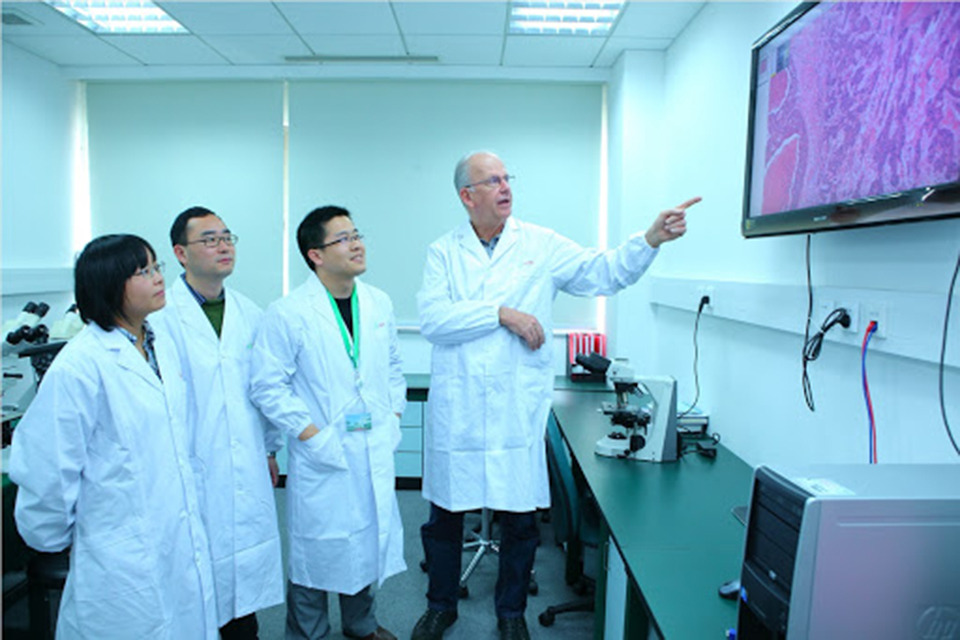At its third annual meeting in December, 2020, teams of researchers from the University of Ottawa-Shanghai Institute of Materia Medica Joint Research Center on Systems and Personalized Pharmacology (SIMM)—including 10 uOttawa professors—reported exciting results on new candidate drugs and novel assays.
“It is truly amazing that combining uOttawa expertise in molecular medicine with state-of-the art pharmacology and medicinal chemistry expertise from SIMM has led within three short years to candidate drugs and therapeutic avenues,” said Dr. Daniel Figeys, co-director, University of Ottawa-SIMM Joint Research Center on Systems and Personalized Pharmacology
The center also provides unique training opportunities through online learning and on-site training in Ottawa and Shanghai.
Identifying novel inhibitors for tuberculosis therapy
Tuberculosis (TB) causes more deaths worldwide than any other infectious disease. Given the emergence of drug resistant TB and the lack of novel antibiotics for this bacterial disease, there is an urgent need for new therapies. Dr. Jim Sun, uOttawa assistant professor of Biochemistry, Microbiology and Immunology (BMI) and Drs. Weibo Yang and Zhongliang Xu, professors of Medicinal Chemistry at SIMM have identified new ways to modify the body’s response to TB.
Dr. Sun noted: “Our discovery of new drugs for a novel host target that was previously considered undruggable offers considerable potential in boosting our natural immunity to tuberculosis. The continued development of these drugs will lead to new alternative therapies for infectious diseases that can overcome the global antibiotic resistance crisis.”
Discovery may lead to treatment of aggressive leukemia
Dr. Jean-Francois Couture, uOttawa professor and chair of BMI and Dr. Mingyue Zheng, professor, Drug Discovery and Design Center at SIMM have identified compounds that could be used to manipulate gene expression in order to disrupt the development and maintenance of certain types of leukemia. “This discovery may bring to light a very powerful combinatorial therapy to treat aggressive forms of leukemia,” says Dr. Couture.
Learning the language of Crohn’s Disease
Crohn’s Disease shows itself in stark differences in the gut microbiome, which may have a role in the disease’s signature inflammation. Dr. Alain Stintzi, uOttawa professor at BMI and Dr. Figeys, together with Dr. Yang Ye, deputy director of SIMM, have developed tests for personalized microbiome drug screening. As well, Dr. Couture developed a test targeting a microbiome metabolite involved in Crohn’s Disease. Screening of compounds is ongoing.
Hydrogen sulfide, produced by gut bacteria, is emerging as an actor in colonic diseases Dr. Couture noted that “the identification of a molecule targeting sulfide-producing enzymes may hold great promise in controlling the formation of pro-inflammatory molecules and therefore mitigate the dreadful impacts related to intestinal bowel diseases.“
New strategies to protect neurons in Parkinson’s disease
Drs. Mireille Khacho and Mary-Ellen Harper of BMI, and Dr. Ruth Slack, uOttawa professor of Cellular and Molecular Medicine (CMM) teamed up with Drs. Linyin Feng and . Haiyan Zhang, professors in the Department of Pharmacology at SIMM, to develop specific assays for screening compounds that can enhance mitochondrial efficiency in Parkinson’s Disease (PD). These studies are based on the uOttawa team’s unique insights into strategies that can protect neurons in neurodegenerative diseases. Screening of compounds should start in 2021. Dr. Khacho writes: “Identifying new compounds that target mitochondrial function is a novel and promising approach not only for PD, but also many other mitochondrial disorders."

